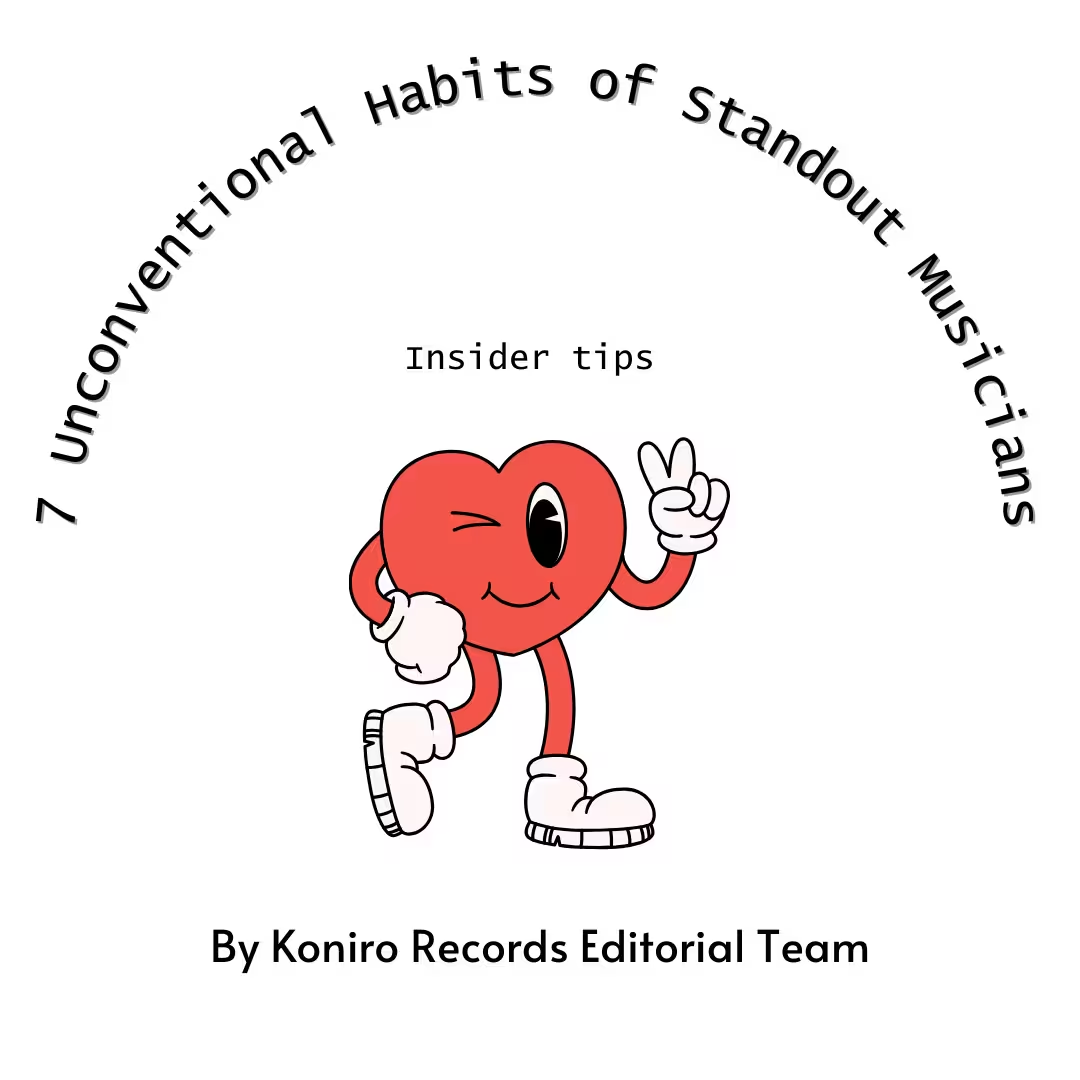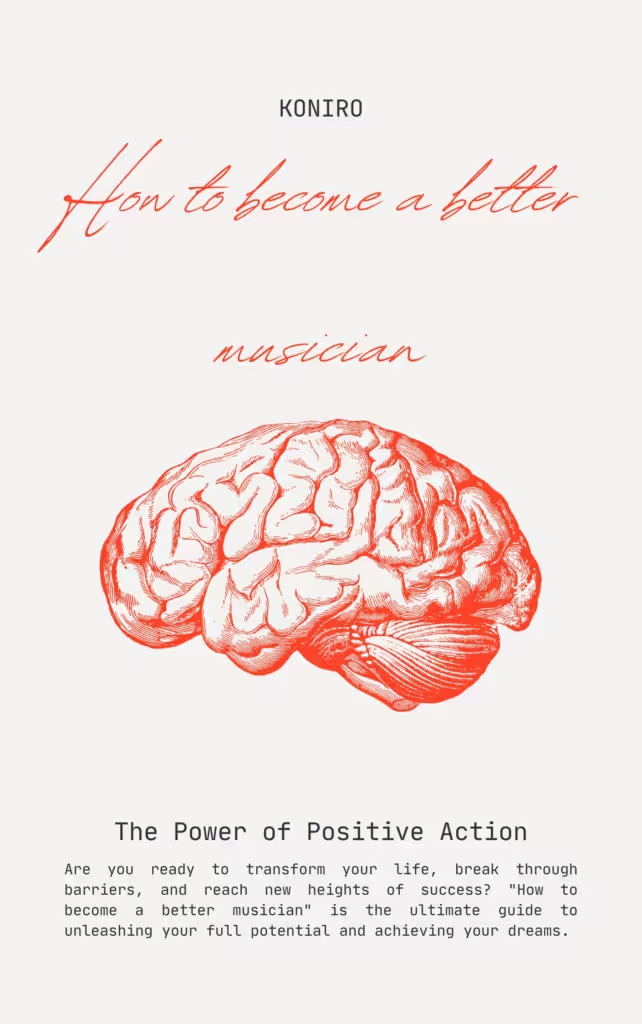Your cart is currently empty!

7 Unconventional Habits of Standout Musicians
•

7 Unconventional Habits of Standout Musicians (And How to Adopt Them)

CLASSIC TEE I FVCK WITH MUSIC
The 100% cotton unisex classic tee will help you land a more structured look. It sits nicely, maintains sharp lines around the edges, and goes perfectly with layered streetwear outfits. Plus, it’s extra trendy now!
• 100% cotton
• Sport Grey is 90% cotton, 10% polyester
• Ash Grey is 99% cotton, 1% polyester
• Heather colors are 50% cotton, 50% polyester<br /…
In the competitive world of music, standing out from the crowd is essential for success. While talent and hard work are important, many of the most successful musicians have developed unconventional habits that give them an extra edge. By thinking outside the box and approaching their craft in unique ways, these artists are able to boost their creativity, productivity, and overall success.
In this comprehensive guide, we’ll explore 7 unconventional habits that help musicians stand out from the pack. We’ll also provide practical tips on how you can adopt these habits to take your own musical journey to the next level. Whether you’re an aspiring artist or a seasoned pro looking to shake things up, these insights can help you unlock new potential in your music career.

How to become a better musician EBOOK
How to Become a Better Musician is the ultimate guide to improving your musical skills, creativity, and performance. Discover practical tips on practice routines, music theory, songwriting, and collaboration to unlock your full potential and elevate your musicianship.
- Embracing Deliberate Discomfort
The Power of Pushing Boundaries
One habit that sets exceptional musicians apart is their willingness to embrace discomfort and push themselves outside their comfort zones. Rather than sticking to what feels safe and familiar, standout artists actively seek out challenges that force them to grow.
How Top Musicians Practice This Habit
Experimenting with unfamiliar genres and styles
Collaborating with musicians from different backgrounds
Performing in new and intimidating venues
Taking on ambitious projects that feel slightly out of reach
Putting It Into Practice
To adopt this habit yourself, look for opportunities to deliberately step outside your musical comfort zone:
Learn a new instrument or genre that challenges you
Attend open mics or jam sessions with unfamiliar musicians
Set ambitious goals that feel slightly scary but exciting
Say yes to performance opportunities that make you nervous
By regularly pushing your boundaries, you’ll expand your skills and unlock new creative possibilities.

Services
Explore our professional music services at Koniro Records, designed to elevate your sound and career. From custom beat production and songwriting to advanced mentorship programs, we offer tailored solutions for artists and creators. Whether you’re looking for exclusive content, professional licensing options, or hands-on guidance from industry experts, our comprehensive services will help you achieve your musical goals. Join our community and take your artistry to the next level with personalized support and innovative tools. Discover how Koniro Records can help you make your mark in the urban music scene.
- Implementing Structured Randomness
Finding the Sweet Spot Between Order and Chaos
While discipline and structure are important, too much rigidity can stifle creativity. Standout musicians have found ways to inject an element of randomness into their routines and creative processes.
How Top Musicians Practice This Habit
Using randomization tools to generate song ideas or chord progressions
Imposing arbitrary constraints or rules on songwriting sessions
Incorporating chance elements into live performances
Regularly shaking up practice routines to avoid stagnation
Putting It Into Practice

Custom Song Production
Bring your musical vision to life with a fully customized track produced to match your unique style and artistic direction. Whether you’re a seaso…
Here are some ways to bring structured randomness into your own musical practice:
Use a random word generator for lyric inspiration
Roll dice to determine song structure or instrumentation choices
Set a timer and challenge yourself to write a song in 30 minutes
Rearrange your practice space or switch up the order of your routine
By finding ways to balance structure with unpredictability, you can spark fresh ideas and keep your creative process exciting.
- Cultivating Cross-Disciplinary Inspiration
Looking Beyond Music for Creative Fuel
While it’s important to study music, many standout artists find inspiration by exploring other creative disciplines and fields of knowledge.
How Top Musicians Practice This Habit
Drawing songwriting inspiration from literature, visual art, or film
Studying subjects like physics or philosophy to inform musical concepts
Incorporating elements from other art forms into performances
Collaborating with artists from different disciplines
Putting It Into Practice
To adopt this habit, make an effort to seek inspiration beyond the world of music:
Visit art galleries and museums for visual inspiration
Read books on diverse topics and look for musical connections
Take a class in a non-musical subject that interests you
Collaborate with dancers, visual artists, or other creatives
By broadening your sources of inspiration, you’ll bring fresh perspectives and ideas to your music.
- Embracing Strategic Limitations
The Creative Power of Constraints
While it may seem counterintuitive, many standout musicians find that imposing limitations on themselves actually boosts creativity. By working within specific constraints, artists are forced to think more creatively and often produce more innovative work.

Framed poster STAY MOTIVATED
Elevate any space with this stylish framed poster, printed on premium thick matte paper. The matte black frame, crafted from sustainable Ayous wood, adds a sophisticated touch, perfect for any decor.**
– Sustainable Ayous wood frame, 0.75″ (1.9 cm) thick
– Premium paper thickness: 10.3 mil (0.26 mm)
– Lightweight with a sleek Acrylite front protector
-…
How Top Musicians Practice This Habit
Writing songs using only a limited set of instruments or sounds
Imposing time limits on songwriting or recording sessions
Creating entire albums or projects based on specific themes or concepts
Deliberately avoiding certain techniques or tools they typically rely on
Putting It Into Practice
Try incorporating strategic limitations into your own creative process:
Write a song using only three chords
Give yourself one hour to complete a track from start to finish
Create a themed EP based on a specific concept or story
Challenge yourself to write without your go-to instrument
By embracing constraints, you may discover new approaches and push your creativity in unexpected directions.
- Prioritizing Deep Work and Flow States
Maximizing Productivity Through Focused Creation
In a world full of distractions, standout musicians have developed the ability to engage in deep, focused work for extended periods. They prioritize creating ideal conditions for entering flow states – periods of intense concentration and creativity.
How Top Musicians Practice This Habit
Creating dedicated, distraction-free workspaces
Establishing strict “Do Not Disturb” periods for focused creation
Using techniques like time-blocking to maximize productive hours
Developing personalized rituals to trigger creative flow states
Putting It Into Practice

Unisex Hoodie I FVCK WITH MUSIC
Everyone needs a cozy go-to hoodie to curl up in, so go for one that’s soft, smooth, and stylish. It’s the perfect choice for cooler evenings!
• 50% pre-shrunk cotton, 50% polyester
• Fabric weight: 8.0 oz/yd² (271.25 g/m²)
• Air-jet spun yarn with a soft feel and reduced pilling
• Double-lined hood with matching drawcord
• Quarter-turned body to avoid creas…
To cultivate your own deep work habit:
Designate a specific area solely for music creation
Use apps or tools to block distractions during work sessions
Experiment with different times of day to find your peak creative hours
Develop a pre-work ritual to signal your brain it’s time to focus
By prioritizing deep work, you can dramatically increase your creative output and the quality of your music.
- Embracing Iterative Creation
The Power of Rapid Prototyping and Refinement
Rather than striving for perfection from the start, many standout musicians embrace an iterative approach to creation. They focus on quickly generating ideas and prototypes, then refining and improving through multiple iterations.
How Top Musicians Practice This Habit
Creating multiple versions or arrangements of songs
Sharing works-in-progress with trusted collaborators for feedback
Regularly performing new material live to gauge audience reaction
Using technology to quickly capture and develop musical ideas
Putting It Into Practice
To adopt an iterative mindset in your own process:
Set goals for quantity over quality in initial songwriting sessions
Create multiple demos or versions of tracks before settling on a final arrangement
Share rough drafts with fellow musicians for constructive feedback
Use live performances or social media to test new material with audiences
By embracing iteration, you can refine your ideas more effectively and produce higher quality final products.
- Cultivating a Growth Mindset
Embracing Challenges as Opportunities for Growth
Perhaps the most important habit of standout musicians is cultivating a growth mindset – the belief that abilities and intelligence can be developed through dedication and hard work. This mindset allows them to view challenges as opportunities for growth rather than insurmountable obstacles.
How Top Musicians Practice This Habit
Actively seeking out constructive criticism and feedback
Viewing failures and setbacks as valuable learning experiences
Continuously setting new goals and challenges for themselves
Investing time in developing new skills and knowledge
Putting It Into Practice

Poster RISE UP
Enhance your space with museum-quality posters printed on thick matte paper. Perfect for adding a stylish accent to any room or office, these posters are designed to brighten and elevate your environment.
Premium paper thickness: 10.3 mil
Durable paper weight: 189 g/m²
High opacity: 94% for a smooth finish
ISO brightness: 104% for vibrant colors
Paper source…
To cultivate your own growth mindset:
Reframe negative self-talk into growth-oriented language
Keep a “lessons learned” journal to reflect on challenges and progress
Regularly set new goals that push you outside your comfort zone
Invest in ongoing education through lessons, workshops, or online courses
By adopting a growth mindset, you’ll be better equipped to overcome obstacles and continuously improve as a musician.
Putting It All Together: Creating Your Own Unconventional Habits
Now that we’ve explored these 7 unconventional habits of standout musicians, it’s time to consider how you can incorporate them into your own musical journey. Here are some steps to get started:
Assess your current habits: Take some time to reflect on your existing routines and approaches to music creation. Identify areas where you may be stuck in a rut or relying too heavily on familiar patterns.

Basic license
Affordable and high-quality beats for personal projects, non-commercial use, and YouTube content. Perfect for artists and creators looking to elevate their sound without breaking the bank. Unlock your music’s potential with professionally crafted beats.
Choose one habit to focus on: Rather than trying to adopt all 7 habits at once, pick the one that resonates most strongly with you or addresses a specific area you’d like to improve.
Start small: Begin by incorporating small elements of the habit into your existing routine. For example, if you want to embrace deliberate discomfort, start by spending 15 minutes a day practicing an unfamiliar genre.
Track your progress: Keep a journal or log to document how implementing the new habit affects your creativity, productivity, and overall enjoyment of music.

PREMIUM QUALITY I LOVE MYSELF HOODIE
Who knew that the softest hoodie you’ll ever own comes with such a cool design. You won’t regret buying this classic streetwear piece of apparel with a convenient pouch pocket and warm hood for chilly evenings.
• 100% cotton face
• 65% ring-spun cotton, 35% polyester
• Front pouch pocket
• Self-fabric patch on the back
• Matching flat drawstrings
• 3-p…
Adjust and iterate: Pay attention to what works well and what doesn’t. Be willing to adjust your approach and experiment with different ways of implementing the habit.
Gradually expand: As you become comfortable with one habit, begin incorporating elements of the others. Over time, you can develop your own unique combination of unconventional habits that boost your musical growth.
Share and collaborate: Connect with other musicians who are also interested in developing unconventional habits. Share experiences, offer support, and consider collaborating on projects that push you both outside your comfort zones.

How to become a better musician EBOOK
How to Become a Better Musician is the ultimate guide to improving your musical skills, creativity, and performance. Discover practical tips on practice routines, music theory, songwriting, and collaboration to unlock your full potential and elevate your musicianship.
Overcoming Common Obstacles
As you work to incorporate these unconventional habits into your musical practice, you may encounter some challenges. Here are some common obstacles and strategies for overcoming them:
- Lack of Time
Many musicians struggle to find time to implement new habits or practices. To overcome this:
Start with small, manageable chunks of time (even 10-15 minutes can make a difference)
Look for ways to integrate new habits into your existing routine
Use time-blocking techniques to schedule dedicated practice sessions
Consider waking up earlier or adjusting your schedule to prioritize your music
- Fear of Failure
Trying new approaches can be intimidating, and fear of failure may hold you back. To address this:
Reframe “failures” as learning opportunities and valuable data
Start by experimenting in low-stakes situations (e.g., private practice sessions)
Share your goals with supportive friends or fellow musicians for accountability
Celebrate small victories and progress along the way
- Lack of Resources
Some habits may seem difficult to implement without certain resources or equipment. To work around this:
Get creative with what you have available (e.g., use household items as instruments)
Explore free or low-cost online resources and tools
Connect with other musicians to share resources or collaborate
Invest strategically in key tools or experiences that will have the biggest impact
- Resistance to Change
It’s natural to feel some resistance when trying to change long-standing habits. To overcome this:
Start with small, manageable changes rather than overhauling everything at once
Focus on the potential benefits and exciting possibilities of new approaches
Give yourself permission to experiment and “fail” without judgment
Find an accountability partner or join a community of like-minded musicians
The Long-Term Impact of Unconventional Habits
While adopting these unconventional habits may require some initial effort and adjustment, the long-term benefits can be truly transformative for your musical career. By consistently practicing these approaches, you may experience:
Increased creative output and innovation in your music
Greater resilience in the face of challenges and setbacks
Improved ability to stand out in a crowded music industry
Enhanced collaborations and networking opportunities
A deeper sense of fulfillment and enjoyment in your musical practice
Accelerated skill development and musical growth
Increased adaptability to changing industry trends and technologies
Remember that developing new habits takes time and patience. Be kind to yourself throughout the process and focus on consistent, incremental progress rather than perfection.
Conclusion: Forging Your Own Path to Musical Success
The music industry is constantly evolving, and standing out from the crowd requires more than just raw talent. By adopting these 7 unconventional habits – embracing deliberate discomfort, implementing structured randomness, cultivating cross-disciplinary inspiration, embracing strategic limitations, prioritizing deep work, embracing iterative creation, and cultivating a growth mindset – you can set yourself apart and unlock new levels of creativity and success.
Remember that these habits are just a starting point. As you experiment and grow, you’ll likely develop your own unique approaches and routines that work best for you. The key is to remain curious, open-minded, and willing to push beyond your comfort zone.
So, which unconventional habit will you start with? Whether you’re a beginner just starting your musical journey or a seasoned pro looking to shake things up, there’s never been a better time to embrace new approaches and stand out from the crowd. Your next creative breakthrough may be just one unconventional habit away!
-
 Consistency Beats Talent: The Music Industry's Secret
Consistency Beats Talent: The Music Industry's Secret -
 The Psychological Barriers Holding Musicians Back (And How to Overcome Them)
The Psychological Barriers Holding Musicians Back (And How to Overcome Them) -
 The Shocking Truth About Making It in the Music Industry (What They Don't Want You to Know)
The Shocking Truth About Making It in the Music Industry (What They Don't Want You to Know) -
 Elevate Your Musical Journey: Koniro Records' Online Course for Aspiring Musicians
Elevate Your Musical Journey: Koniro Records' Online Course for Aspiring Musicians -
 How to Build Your Brand as an Independent Musician: 5 Key Steps
How to Build Your Brand as an Independent Musician: 5 Key Steps
Discover more from Koniro Records | Proudly independant
Subscribe to get the latest posts sent to your email.